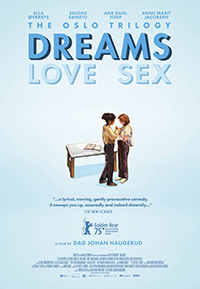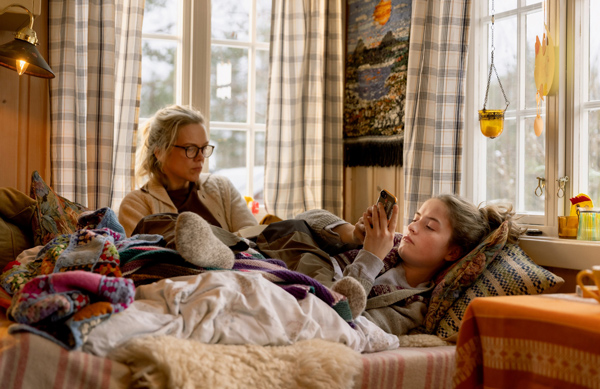Love on the Brain: Haugerud Caps Trilogy with Teenage Wasteland
 With his latest film Dreams (Sex Love) (aka Drømmer), the final installment in his thematic trilogy, Norwegian director Dag Johan Haugerud clasps his most cohesive segment on a teenage girl’s ineffable, transformative brush with first love. The title of each film in the trilogy can feel misleading as each segment/situation/character is caught up in the intersection of these three states, each designed to reflect on the angle of intention. So perhaps it is most appropriate that the formative stage of desire, which leads to sex and love, begins in the mind of a dreamy seventeen-year-old who is led to comprehend her own awakening by comparing unnamed emotions to those of a fictional girl she first reads about in an obscure French novel.
With his latest film Dreams (Sex Love) (aka Drømmer), the final installment in his thematic trilogy, Norwegian director Dag Johan Haugerud clasps his most cohesive segment on a teenage girl’s ineffable, transformative brush with first love. The title of each film in the trilogy can feel misleading as each segment/situation/character is caught up in the intersection of these three states, each designed to reflect on the angle of intention. So perhaps it is most appropriate that the formative stage of desire, which leads to sex and love, begins in the mind of a dreamy seventeen-year-old who is led to comprehend her own awakening by comparing unnamed emotions to those of a fictional girl she first reads about in an obscure French novel.
Johanne (Ella Øverbye) has become smitten with Johanna (Selome Emnetu), a new art instructor at her school. While realizing a relationship with her teacher is inappropriate, her longing eventually leads her to placing herself firmly within Johanna’s orbit when she suddenly shows up on her doorstep. Feigning an interest in knitting, she attends nine separate visits to her teacher’s home, eventually writing down the experience in explicit detail. A year later, she shows her manuscript to her grandmother (Anne Marit Jacobsen), a poet who Johanne trusts above everyone else. Her grandmother compliments her writing skills, suggesting she give it to her publisher, but not before Johanne also shares the manuscript with her mother, Kristin (Ane Dahl Torp), who is initially more alarmed at the sexually explicit content Johanne has written. Eventually, the three of them suss out what happened and what might have been exaggerated, and all roads lead back to Johanna’s opinion before publication becomes imminent.

What seems most readily apparent about Dreams is how perception is paramount in our initial forays and experiences with quelling our desires. The realm of fantasy, as one character succinctly points out, is inherently self-centered and doesn’t take into account how the object of such desire might respond. As has been Daugerud’s previous loquacious fashion, his last installment is a veritable rush of rich dialogue and internal narration. There’s never a moment where something isn’t being conveyed through talking, which does lend a certain precision to the processing of emotions, mostly for a trio of women deliberating the notion of fiction vs. reality, memory vs. fact, and ambiguity vs. truth.
Johanne is, per her age, a bit of an empty vessel, the passive vacuity displayed by Ella Øverbye not unlike a young Isabelle Huppert in 1977’s The Lacemaker or Lola Creton in Mia Hansen-Love’s Goodbye First Love (2011). Without the barrage of internal monologues, it would be unclear as to what she’s actually feeling. A bit more interesting are the actual conversations between her mother and grandmother, each deliberating how to interpret Joanna’s docufiction novella. It allows them a slight opportunity to rehash their own memories on love, sex, and feminist representation (perhaps most entertainingly served in their disagreement about the merits of the 1983 film Flashdance).
Although Daugerud makes one choice, comedic interplay with the film’s dietetic soundtrack, the film’s musical cues do tend to overwhelm the delicacies of the subject matter. Like the preceding chapters, there’s a significant fluidity in the various sexualities being depicted, resisting the rigidity of labels. The character surviving the through line through each chapter, Bjorn (Lars Jacob Holm), makes a surprise appearance in the finale which suggests Johanne is still far from exploring, but at last able to move onto her next chapter after releasing her experience into the wild, finally letting go.
Reviewed on February 19th at the 2025 Berlin International Film Festival (75th edition) – Main Competition. 101 mins.
★★★/☆☆☆☆☆


